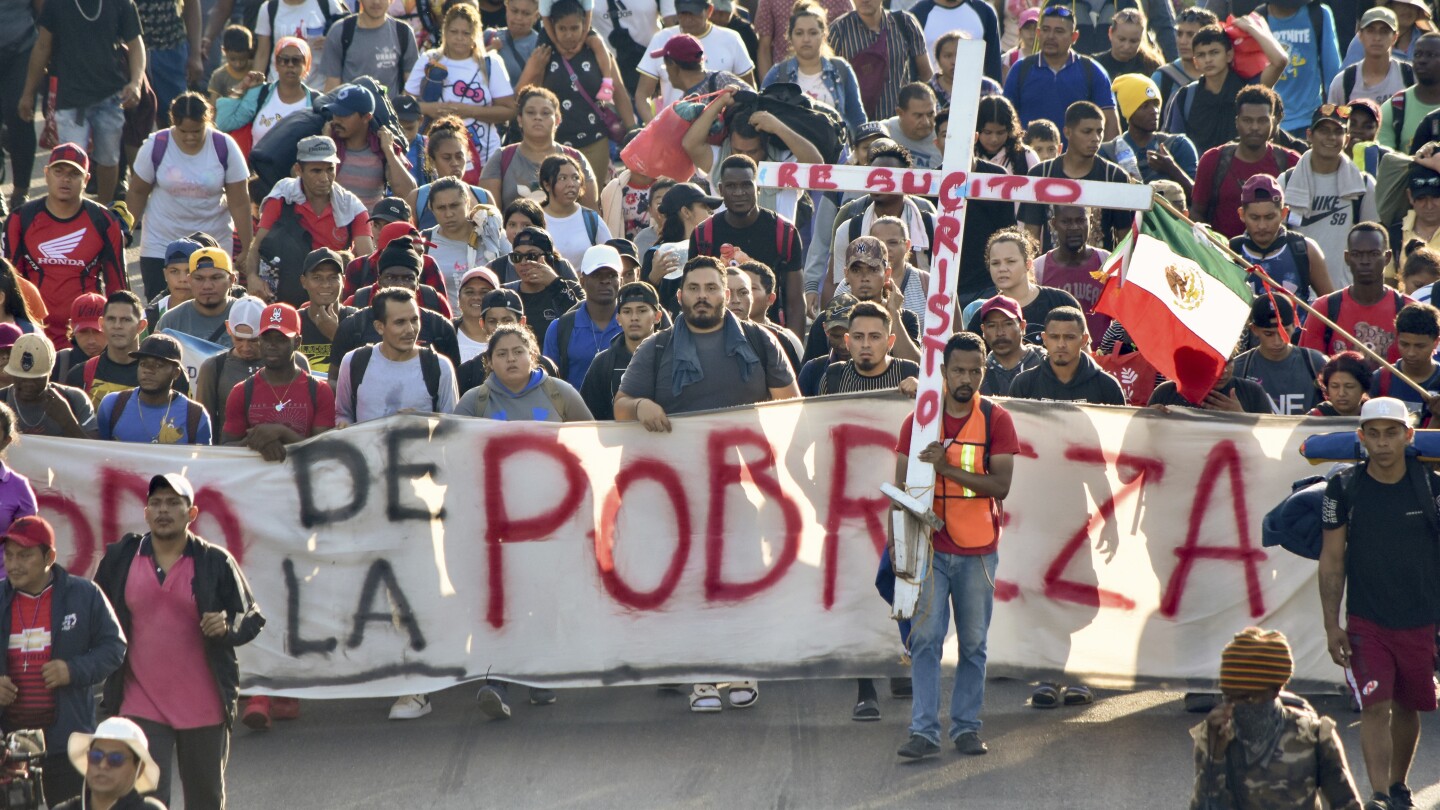HUIXTLA, Mexico (AP) — Christmas Day meant the same as any other day for thousands of migrants walking through southern Mexico: more trudging under a hot sun.
There were no presents, and Christmas Eve dinner was a sandwich, a bottle of water and a banana handed out by a local church to some of the migrants in the town of Álvaro Obregón, in the southern state of Chiapas, which borders Guatemala.
Migrants spent Christmas night sleeping on a scrap of cardboard or plastic stretched out under an awning or tent, or the bare ground.
In the morning, it was waking as usual at 4 a.m., to get an early start and avoid the worst of the heat, walking to the next town, Huixtla, 20 miles (30 kilometers) away.
Karla Ramírez, a migrant from Honduras who was traveling with other adults and four children, got to Álvaro Obregón too late Sunday to get any of the food being given out by the church. So they had to buy whatever little they could afford.
“It was sad: we have never, ever been in the street before,” Ramírez said. “Our Christmas dinner was some mortadella, butter and tomato, with a tortilla.”
Mariela Amaya’s seven-year-old son didn’t understand why they had to spend Christmas this way. Amaya, also from Honduras, tugged the hand of her tired, recalcitrant son as they walked.
“They don’t understand why we have to do this to get a better life,” Amaya said. Nor did the governments of Mexico and the United States, she said.
“Why can’t they help us? We need their help,” she said.
What little help there was came from local families, one of whom gave out tamales — traditional seasonal fare — and water to the passing migrants.
The migrants included single adults but also entire families, all eager to reach the U.S. border, angry and frustrated at having to wait weeks or months in the nearby city of Tapachula for documents that might allow them to continue their journey.
Mexico claims it doesn’t give out transit visas, but migrants keep hoping to get some sort of document so they could at least take buses to the border.
“This journey has been really hard for us migrants. We need the (Mexican) immigration office and the government to have some pity on us, and give us a safe conduct pass,” said Jessica García, a migrant from Venezuela.
Mexico says it detected 680,000 migrants moving through the country in the first 11 months of 2023.
At around 6,000 people, the migrant caravan that set out Sunday was the largest one since June 2022, when a similarly sized group departed Tapachula.
And like the 2022 caravan — which started as U.S. President Joe Biden hosted leaders in Los Angeles for the Summit of the Americas — this year’s Christmas caravan came a few days before U.S. officials are to meet with their Mexican counterparts in Mexico City to explore ways of stemming the number of migrants showing up at the U.S. southwest border.
The Mexican government has already said it is willing to help try to block migrants from crossing Mexico; the government had little choice, afte r U.S. officials briefly closed two vital Texas railway border crossings, claiming they were overwhelmed by processing migrants.
That put a chokehold on freight moving from Mexico to the United States, as well as grain needed to feed Mexican livestock moving south. The rail crossings have since been reopened, but the message was clear.
U.S. Secretary of State Antony Blinken is expected to arrive in Mexico City Wednesday to hammer out new agreements to control the surge of migrants seeking entry into the United States. The U.S. delegation will also include Homeland Security Secretary Alejandro Mayorkas and White House homeland security adviser Liz Sherwood-Randall.
This month, as many as 10,000 migrants were arrested per day at the U.S. southwest border.
In May, Mexico agreed to take in migrants from countries such as Venezuela, Nicaragua and Cuba who had been turned away by the U.S. for not following rules that provided new legal pathways to asylum and other forms of migration.
But that deal, aimed at curbing a post-pandemic jump in migration, appears to be insufficient as numbers rise once again, disrupting bilateral trade and stoking anti-migrant sentiment among conservative voters in the U.S.
Arrests for illegal crossing topped 2 million in each of the U.S. government’s last two fiscal years, reflecting technological changes that have made it easier for migrants to leave home to escape poverty, natural disasters, political repression and organized crime.
____
Follow AP’s coverage of Latin America and the Caribbean at https://apnews.com/hub/latin-america

